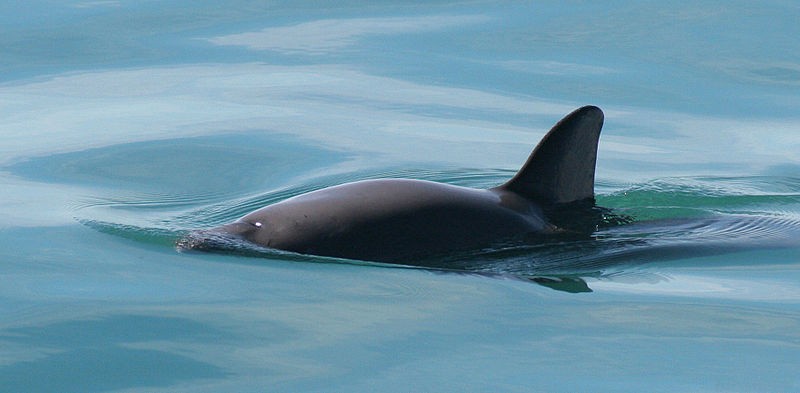The world's tiniest marine animal, the vaquita, has long been on the verge of extinction. Over the previous decade, the number of porpoises with black ringed eyes and smiling, upturned lips have plummeted by 99 percent.

Dwindling Numbers
After a recent study published in Royal Society Publishing showed less than ten individuals are left in the seas of their small native area between Baja California and Mexico, experts fear their future is now more uncertain than ever.
However, others believe there is still a chance for the endangered species to survive despite the odds.
Although researchers can still hear their high-pitched calls and echolocation clicks collected on auditory monitoring equipment placed throughout their habitats, Barbara Taylor, a marine conservation biologist for the National Oceanic and Atmospheric Administration, says they are hopeful to find a solution.
In the past, Taylor has tracked down endangered species that have been wiped off, and she's desperate to prevent the little, timid cetacean from joining that list.
It won't be a simple process. Vaquitas suffer many dangers, including a profitable illicit fishing business, indifference to politicians, and inadequate conservation efforts, as mentioned by World Wildlife.
The totoaba, an endangered fish with alleged medicinal capabilities that sells for thousands of dollars on China's black market, shares the Gulf of California with highly prized sea species such as the vaquita.
The large mesh netting known as "gillnets" used by totoaba poachers and local fishers may easily entangle vaquitas, as well as sea turtles and whales.
Related Article : Florida Manatees are Starving to Death Despite Feeding Efforts
Conservation Efforts
In this regard, the United States has attempted to exert pressure on Mexico. According to the Office of the United States Trade Representative, the US Trade Representative has requested consultations with the Mexican government.
According to an NBC Chicago report, the US Trade wants to determine whether environmental commitments were made under the US-Mexico-Canada Agreement (US-Mexico-Canada Agreement), which replaced Nafta in 2020, to protect vaquitas have failed.
Embargoes on the Mexican seafood sector have also been imposed by the United States, including prohibiting importing seafood obtained in gillnets in the vaquita area. Concerns over the conservation of marine turtles prompted the United States to suspend importing all Mexican wild-caught shrimp last year.
Although the Mexican government has made totoaba fishing illegal and gillnets in the region prohibited, just a handful of the promised punishments have been implemented.
There have also been initiatives to reward fishers who replace harmful gear, but the monies have not been dispersed fairly, leaving fishers in a bind.
The president of Mexico, Andrés Manuel López Obrador, has spoken out about foreign meddling and sanctions on the Mexican seafood sector and a policy reversal and a reduction in enforcement in the protected area.
Illegal fishing has proliferated while authorities' crackdown has decreased. The rise of the totoaba market, aided by the cartels, corresponds to a 50 percent yearly reduction in vaquita populations. International campaigners have swayed the tides.
Even individuals aware of the dangers that vaquitas face have questioned the worth of preserving them at the expense of local economies. In the vaquita area, fishing and the local economy are inextricably linked. Gillnets were employed to harvest blue shrimp and other species that live in the biodiverse waters long before the totoaba market exploded.
No More in the Wild
There have never been a lot of vaquitas in the wild. They usually only produce calves every two years, and it takes them decades to develop and procreate. However, according to Felbab-Brown, the lack of law enforcement in the region has only aggravated the problem.
Environmentalists say it will be far more challenging to bring the species back from the edge without local cooperation and enforcement, especially now that time is running short.
Worsening Situation
According to Francis Gulland, Commissioner of the US Marine Mammal Commission, getting community buy-in is a far more effective strategy than attempting to enforce top-down bans. It's a lesson she hopes may be learned in time to save other species from extinction shortly.
"We don't pay attention until we're in a complete catastrophe," she adds, pointing out that conservation efforts didn't begin until only a few hundred vaquitas were remaining when the population was just a few hundred.
When the population declined further, activists sought to capture vaquitas and transport them to protected regions. Still, the initiative was quickly halted when one vaquita died due to the operation's failure.
She thinks there's still time to save the vaquita, but it's not much. "They will live if we can prevent them from getting captured in nets," she adds.
For the most recent updates from the animal kingdom, don't forget to follow Nature World News!
© 2026 NatureWorldNews.com All rights reserved. Do not reproduce without permission.





